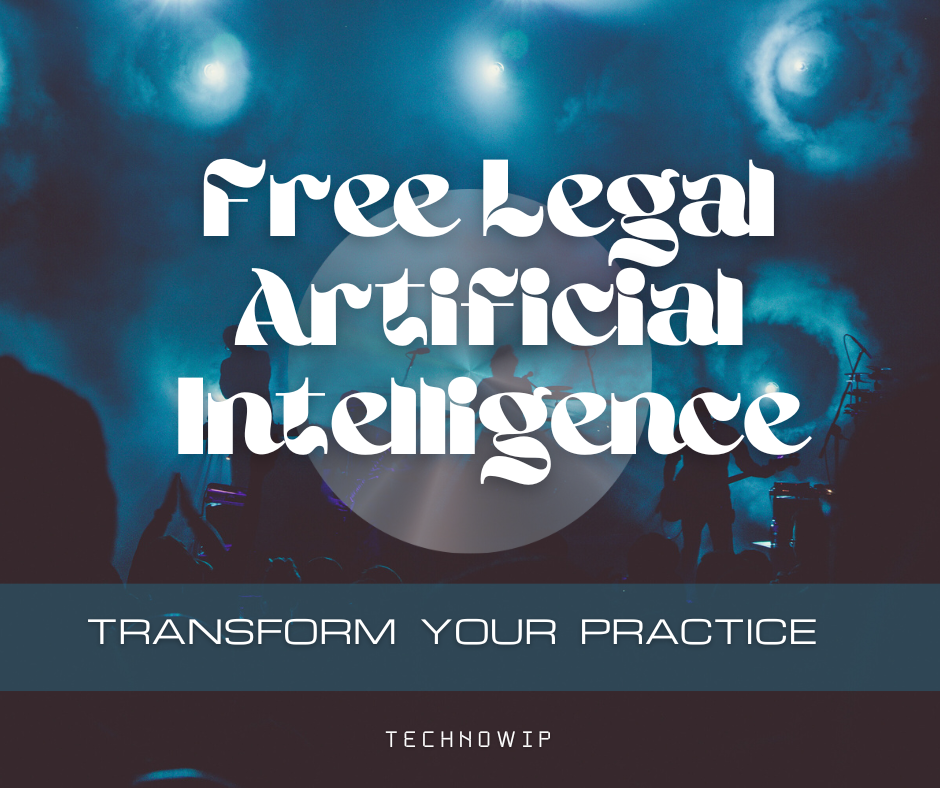Introduction
Free Legal Artificial Intelligence (AI) has emerged as a transformative force within legal practices worldwide, revolutionizing practices by automating repetitive tasks, analyzing complex documents, predicting case outcomes and streamlining operations to meet increasing caseload and administrative demands. Law firms and independent practitioners increasingly depend on AI for smooth operations to stay afloat, so their attorneys can focus their energies where it matters: strategizing client strategies while providing results.

In this post, we’ll delve deep into the practical applications of free legal AI tools, discussing their value to your practice without incurring significant upfront costs. We will present case studies illustrating AI’s value in real world scenarios before providing step-by-step implementation instructions of such tools . So let’s see how AI can transform legal practices!
Pain: The Daily Challenges Legal Professionals Face
Legal professionals face many pressures: meeting tight deadlines, managing extensive documentation, and assuring accurate and efficient outcomes. Lawyers, paralegals and legal researchers spend many hours performing repetitive and time-consuming tasks such as document review, due diligence reviews, contract analyses and legal research.-Many which may take hours of their day completing them. According to the American Bar Association’s estimates, 40% of lawyers spend at work performing administrative or operational duties, leaving less time available for casework and strategic planning planning activities.
Error rates during document review can have serious repercussions, from damaged client relationships to lost cases. Furthermore, document review tasks have an adverse impact on lawyers themselves: it contributes heavily towards stress levels and mental health challenges among other professions – with lawyers ranking high on surveys of professions most vulnerable to stress-induced diseases and related mental health challenges compared with others in society today. Furthermore, traditional management techniques no longer suffice in an age when clients expect faster results with lower costs for these tasks.
Agitate: Recognizing the Struggle with Traditional Processes
No matter your skill, traditional methods make meeting productivity goals harder than they need to be. Spending hours manually reviewing documents and conducting research makes keeping up with caseloads while at the same time dedicating enough time for practice development, growth and work-life balance can be tough without help from outside. With ever increasing volumes of legal information becoming readily accessible via digital means alone can seem like an impossible feat – which makes the benefits of legal support services all that much sweeter!
Let us not overlook financial concerns: software solutions promising efficiency often come at steep cost tags that smaller firms and solo practitioners struggle to justify. Due to cost concerns as well as misconceptions that AI solutions require specialized training or are complex tools, many professionals remain wary of AI solutions despite its potential advantages.
Solution: Leveraging Free Legal AI to Streamline Your Practice
Free legal AI tools are game changers, offering practical solutions to boost productivity without increasing expenses. By automating time-consuming tasks like document review, contract analysis and legal research – including automating them entirely! .AI frees you up for higher value activities like document creation or review or research. Here are just a few areas in which free AI tools could revolutionize legal work:
- Document Review and Analysis: AI-powered document review tools employ Natural Language Processing (NLP) technology to quickly understand legal terminology, extract essential details and identify inconsistencies within minutes rather than hours.
- Legal Research and Precedent Analysis: AI tools have the power to sift through thousands of case laws, rulings and statutes in an instant to bring you relevant data that applies specifically to your situation, dramatically cutting research time down significantly.
- Contract Review and Due Diligence: AI-driven platforms designed for contract analysis identify clauses, detect inconsistencies and flag unusual terms – simplifying due diligence processes significantly.
- Predictive Analysis for Case Outcomes: AI tools provide predictive analyses that enable lawyers and defense attorneys to easily recognize trends, predict possible outcomes and suggest strategies. They help build stronger cases.
- Automated Billing and Time Tracking: Automating invoicing and time tracking ensures accuracy while protecting against revenue leakage, an often problematic aspect of manual billing processes.
Here is how free AI platforms have made an observable impactful contribution to legal practices.

Case Study 1: Enhancing Document Review Efficiency
Context: A mid-sized law firm in New York was experiencing difficulties managing the large volume of legal documents across their cases, which required reviewing each one manually by junior lawyers and paralegals – creating delays to case progress while increasing operational costs.
Solution: The firm implemented an AI-powered document review tool, specifically developed to review legal documents. Legal assistants were then able to upload files directly for analysis and tagging of critical information quickly – with legal assistants being able to instantly spot inconsistencies, categorize documents quickly and identify relevant keywords instantly through this free AI software tool.
Results: After six months, this firm successfully reduced document review time by 50% allowing more junior staff members to assist with case strategy and client communications. Furthermore, their efficient boost enabled the firm to take on more clients without increasing overhead costs thereby driving revenue growth while simultaneously improving service quality.
Case Study 2: Streamlining Legal Research with AI
Context: Solo practitioners tend to juggle multiple duties at once; taking on client intake, legal research and court appearances all on their own. Sarah was one such solo attorney in California whose legal research took up too much of her week’s efforts, preventing her from meeting new clients or working on case strategy effectively.
Solution: Sarah deployed an AI-powered legal research tool which allowed her to quickly comb through case law, statutes and legal references quickly. The AI solution offered targeted search results as well as highlighted relevant case summaries to give Sarah access to essential data without manually poring through pages upon pages of pages of information.
Results: Sarah was able to reduce research time by 60%, which allowed her to better manage her workload and accept additional cases – leading her to see an estimated 30% rise in revenue within one year!
My Personal Take on AI in Legal Practice
At first, when exploring AI for my practice I was skeptical. AI often has the reputation of being too complex or reserved only for techies. After some trial-and-error however, I discovered that free AI tools are actually designed with users in mind: no steep learning curve or steep acquisition process required – making AI well worth considering as an investment option!
Case Study 3: Contract Review Efficiency with AI
Context: A real estate law firm frequently managed a high volume of contracts that required extensive review for compliance, risk analysis and terms examination. Manually reviewing these documents consumed time as well as creating opportunities for error, sometimes leading to unexpected setbacks caused by overlooked clauses.
Solution: By adopting a free contract review AI tool, the firm was able to streamline their due diligence and analysis processes, eliminating ineffective clauses or potential issues from across contracts while making it simpler for lawyers to focus on important contract aspects.
Results: Within three months, the firm observed a 40% decrease in contract review time and improved contract accuracy, leading to less error rate among clients and freeing up time for lawyers at the firm to focus on meeting client concerns more directly, which ultimately enhanced client satisfaction and trust with them.

How I See AI Shaping My Legal Practice
AI has transformed my work faster and more accurately. At first I was skeptical. Over time however, I saw that instead of losing control, AI freed up time for me to focus on strategic aspects that matter more in cases.
Case Study 4: Predictive Analysis for Case Outcomes
Context: A litigation firm specializing in personal injury litigation was faced with the challenge of accurately forecasting case outcomes while meeting client expectations. Manually analyzing historic data to predict outcomes could take both time and resources , making predictions both subjective and time consuming.
Solution: The firm utilized an AI-powered predictive analysis tool which assessed historical case information in order to predict outcomes, offering insight into possible case directions.
Results: Utilizing this tool enabled the firm to set more accurate expectations and refine case strategy, leading to a 20% increase in case success rate thanks to better informed clients, data-driven strategies and robust case plans.
How AI Changed My Perspective on Client Interaction
AI tools were most pleasantly surprising for their effect on client relations. By harnessing better data from predictive tools, I’ve found myself being more honest and open when communicating with clients – they appreciate seeing realistic projections while I feel as though my services have increased value to them and me alike!

How to Get Started with Free Legal AI
Are You Ready for AI Integration into Your Legal Practice? Here Is an Step-By-Step Guide:
- Recognizing Your Needs: Evaluate the areas and tasks within your practice that need streamlining; beginning with repetitive ones like document review or legal research is best.
- Choose the Right Tools: Assessing your specific legal tasks, consider free AI tools that specialize in them. Many offer trials so it may be worthwhile exploring various tools until one meets them best.
- Implement and Train: While certain tools require only limited training to implement and train on, most free legal AI solutions have been designed with simplicity in mind. Start off by testing small samples of contracts or documents.
- Accurate Measure of Impact: Monitor how AI has saved time and resources while at the same time increasing your productivity and client satisfaction.
- Scale Gradually: Once AI usage becomes second nature to you, look to broaden its use across other areas of your practice to maximize benefits and reach their fullest potential.
My Advice on Embracing AI in Law
One thing I have come to appreciate about AI is its role as an enhancer rather than replacement. At first, I feared AI would render my role redundant; but instead it has proven invaluable as an assistant. For anyone hesitant, my advice would be to start small: use AI on one task at first to test out its effects before making your final decision about whether AI fits with your practice or not.
Case Study 5: Time Tracking and Billing Automation
Context: A small firm struggled with time tracking and accurate billing, leading to lost billable hours and revenue. Manual time tracking proved both cumbersome and error prone – jeopardizing their profitability and undermining profitability of the business.
Solution: The firm deployed a free AI-powered time tracking and billing solution which automated timekeeping while creating invoices based on tracked hours to ensure no billable hours were overlooked.
Results: Within months, the firm witnessed a 15% boost to revenue as billing accuracy improved and lost hours decreased significantly. Furthermore, clients appreciated having access to an open billing system which reinforced client trust and fostered client retention.
My Experience with AI in Billing
AI in billing was one of the first changes I implemented, and its effect was immediate and surprising .Freeing up more time than I imagined while relieving end-of-month billing checks of their stress. AI billing has also improved client relations as they now see an accurate representation of my time spent working on projects.

Conclusion
Legal AI tools represent an historic milestone in legal technology. Their accessibility makes a powerful statement about professionalism in an age where efficiency and accuracy matter most. Automating document review, research, contract analysis, predictive outcomes forecasts and billing services frees legal professionals from monotonous tasks so they can focus on providing high quality client service with strategic insights for improved decision making.
AI tools have quickly become indispensable to remaining competitive in an ever-evolving field, helping professionals improve productivity, enhance client service levels and ultimately transform their practices. AI offers free solutions designed to make work smarter instead of harder – whether that means being part of an independent practitioner practice or part of larger firm.
FAQS
What are the primary advantages of employing free legal AI in my practice?
Free legal AI tools boost productivity by automating time-intensive tasks such as document review and billing.
How does AI assist with legal research?
AI tools quickly sort through case law and statutes to deliver pertinent summaries that save valuable research time.
Are free AI tools capable of accurately predicting case outcomes?
Yes, predictive analysis tools can use historical data to provide potential outcomes, helping in strategy creation.
Are I facing difficulty when beginning AI use in my legal practice?
Most free AI tools are user-friendly, designed with minimal training requirements in mind.
How can AI enhance my client relationships?
AI allows accurate predictions and transparent billing, building trust among clients while streamlining communication between your team.
Are artificial intelligence (AI) tools designed solely for large organizations, or can solo practitioners take advantage of them as well?
Solo practitioners can benefit immensely from AI tools that automate tasks and free up more time for case work.
What tasks can AI automate in legal settings?
AI can assist with document review, contract analysis, billing and time tracking services as well as time tracking applications.
Are free legal AI solutions secure when it comes to handling client data?
Reputable AI tools generally prioritize data security; however, it’s wise to assess each tool individually for any security features or concerns that might exist.
How are AI tools utilized in contract review?
AI tools help streamline due diligence processes by quickly recognizing key clauses, flagging discrepancies and speeding up due diligence processes.
How should I implement AI into my legal practice?
Begin by identifying tasks to automate, then investigate free AI tools suitable for these projects.

